Introduction
The COVID-19 outbreak was first reported in late December 2019 in Wuhan, Hubei Province, China. On 11 March 2020, the World Health Organization (WHO) declared the outbreak of COVID-19 to be a pandemic. By the beginning of April 2020, half of the world population was in quarantine or lockdown that lasted until the end of April 2020. Lockdown or social distancing is an effective tool to prevent the spread of a new infectious disease.
In this study we would like to understand the impact of those measures on dietary and lifestyle behaviors. Maintaining a healthy balanced diet consisting of a range of vitamins and minerals, combined with healthy lifestyle factors like adequate sleep and exercise and low stress, most effectively primes the body to boost the immune system and fight against infection and disease. While excess weight and poor diet and sedentary lifestyle can depress the immunity system, Fat tissue produces adipocytokines that can promote inflammatory processes. Malnutrition or a diet lacking in one or more nutrients can impair the production and activity of immune cells and antibodies. Sedentary lifestyle can impair or suppress the normal activity of immune cells.
Maintaining a healthy lifestyle is important aspect for Dubai residents, an example is the Dubai Fitness Challenge which was launched in 2017 it is a month-long initiative aiming to transform Dubai into the most active city in the world, it is all about motivating and involving the residents of Dubai to undertake 30 minutes of continuous exercise per day for 30 days. Dubai Health Authority (DHA) has launched the Lifestyle Clinics in 2018, it aims to provide prevention programmes for persons at risk of diabetes and cardiovascular diseases. It also provides prevention programmes to persons with risk factors, such as those who are overweight and obese, are lacking in physical activity, consume unhealthy food, have a family history of diabetes, are suffering from psychological stress and are smokers.
WHO define health as a complete state of mental, physical and social well-being not merely the absence of disease. Life style is the habits, attitudes, and moral standards, economic level that together constitute the mode of living of an individual or group. Healthy Living is about taking responsibility for your decisions and making smart health choices for today and for the future. So physical healthy living would consist of good Nutrition and eating right, getting physically fit with beneficial Exercise ,adequate rest and proper Stress Management. A healthy lifestyle is a valuable resource for reducing the incidence and impact of health problems, for recovery, for coping with life stressors.
The aim of our research to assess the lifestyle changes that occurred during COVID-19 pandemic on the patients attending primary health care centers of Dubai. Our objectives are to estimate the difference in physical activities and exercises habits during COVID-19 Pandemic in patients attending primary health care centers of Dubai , to estimate the difference in their dietary habits during COVID-19 Pandemic, and to estimate the difference in their smoking habits during COVID-19 Pandemic.
Materials and Methods
Study Setting
The study was conducted among patients attending Primary Health Care Centers in Dubai Health Authority in Dubai. Dubai is the second largest city of the Seven United Arab Emirates with the biggest population at 2.9 million in 2021.The Primary Health Care Centers included in the study were AlBarsha health center, AlSafa health center, Nad AlHammar health center and AlMizhar health center.
Study Design & Participants
This is a cross sectional study conducted among patients attending primary health care centers in Dubai Health Authority in Dubai. The Study was conducted during the period from November 2020 to August 2021. Dubai Health Authority has a total of 12 primary health care centers divided into two regions (Bur Dubai and Deira), 7 centers in Bur Dubai and 5 Centers in Deira, we randomly selected 2 clinics from each region, AlBarsha health center and AlSafa health center from Bur Dubai region and Nad AlHammar health center and AlMizhar health center from Deira Region.
Simple random sampling technique was used to obtain our sample by filling an online consent followed by an online questionnaire provided in an iPad by the researchers. All participants were fully explained about the purpose of this study before signing the online consent and they were approached during their waiting time in the health centers. The study inclusion criteria are patients who are following in primary health care centers in Dubai health authority of all nationalities and both genders with ages above 18 years old and an exclusion of participants whose age fall below 18 years old. A total number of four hundred patients were approached for the study.
Data Collection Tool
An online questionnaire in an iPad was handed to the participants during their waiting time in the primary health care center. Online Consent was attained from each participant before filling the online questionnaire. The questionnaire used in the study consisted of 35 questions divided into four sections. The first section was about the sociodemographic information like age, gender, current employment, weight and height. The second section was about Mediterranean Diet Adherence Screener. The third section was about dietary habits. The fourth and last section was about Lifestyle habits changes during the COVID19 pandemic. Care was taken to assure that the questionnaire was not too long to allow participants to fill it in their waiting time and they were given the choice to choose either an Arabic or English questionnaire whichever is easier for them. The data was collected using simple random sampling method.
Ethics
The proposal of this study was approved by Dubai Scientific Research Ethics Committee, Dubai Health Authority, Dubai, United Arab Emirates. Permission from the primary health care centers was also obtained to conduct this study among their patients. Online consent was obtained from all participants.
Statistical Methods
Data was collected by an online questionnaire using google forms then data was transferred in Excel sheet followed by data analysis using “Statistical Package For Social Sciences (SPSS) version 24. After all data was entered into the SPSS they were reviewed for accuracy.
Interpretation of Results
As a result of this study, data regarding lifestyle changes and habits of primary care attendees in Dubai was collected. In particular, changes in sleep schedule and duration, smoking habits, sports and meal structure were recorded.
Sleep
In terms of sleep, a more positive trend can be seen in the increase of sleeping hours. It should be noted that the sleep patterns of the majority of the participants did not undergo statistically significant changes, staying at a regular level before and after their medical treatment. Among those, 186 interviewees get less than 7 hours of sleep before partaking in medical care. An almost identical number of people, 180, had between 7 to 9 hours of sleep. The smallest group of the three consisted only of 18 people, who slept for more than 9 hours. The first group has experienced the biggest net increase in the amount of sleeping hours after hospital stay, with 73 people experiencing positive sleep changes. In the second group, the difference is much more significant, with the majority of the participants retaining their present sleep patterns. 37 interviewees have decreased their sleep duration, and only 12 have seen an increase. As for the last group, the amount of people who have shortened their sleeping habits differs from those that retained it by a margin of 2.
These results, as shown on the second graph, demonstrate that the majority of people do not change their sleep habits as a result of their medical stay during the pandemic. A significant amount, however, still sees a significant increase in sleep duration. The differences have potential implications on stress and wellness of individuals receiving care in Dubai.
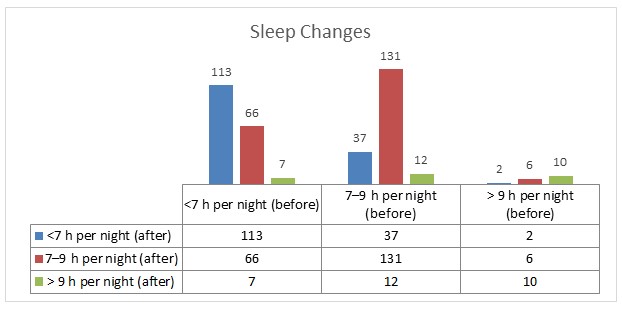
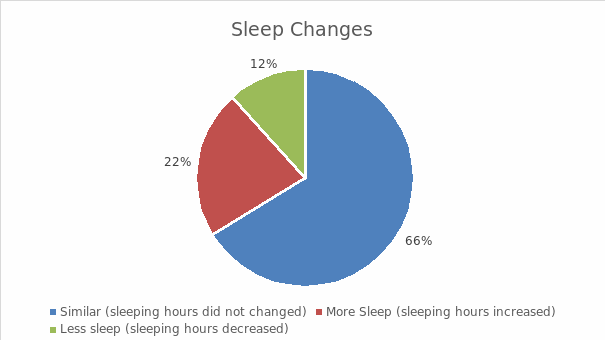
Smoking
Smoking, as an aspect of personal wellbeing, has suffered almost no changes due to attendance of primary healthcare centers in Dubai. Only two people among all of the 384 interviewees have stopped smoking after attending primary care. This amount comprises less than 1% of the whole number of subjects discussed. The majority of the participants attending primary care are not habitual smokers, and none of the people that did not smoke started smoking after attending care. Those that have smoked less than 5 cigarettes a day have mostly been unchanged as well. Both individuals that smoked between 5 and 10, and those that smoked more than 10 have primarily kept to the latter pattern of cigarette usage. Overall, it can be said that attendance of primary care during the COVID-19 pandemic in Dubai is not a significant factor in people’s smoking habits.
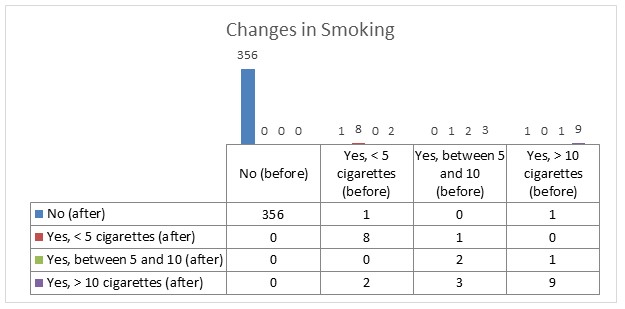
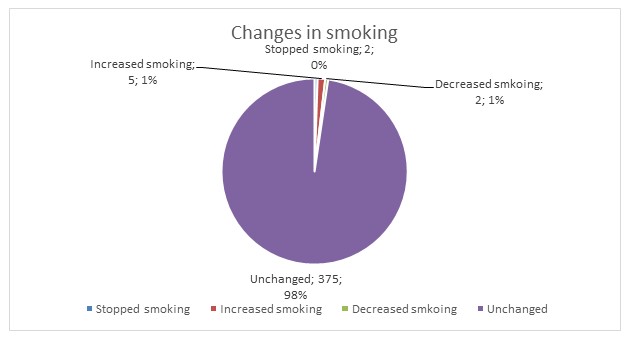
Sports
Discussion surrounding sports activities and primary care during the COVID-19 pandemic is complex. As noted by the questionnaire respondents, the primary trend for those interviewed seems to be a change in sports habits. A more than a third of people previously playing sports have stopped performing this activity after primary care experience. Alternatively, more than a third of those that did not play any sports, started playing sports. 30% percent of the interviewees additionally did not experience any changes to their sports habits. The results can be seen as an indication that primary care in Dubai during the COVID-19 pandemic provides a significant incentive for changing lifestyle habits in regards to physical activity, both in a negative and positive way.
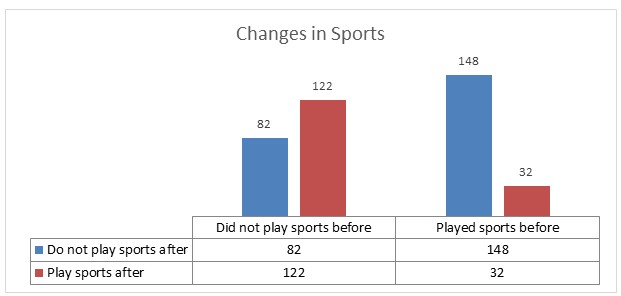
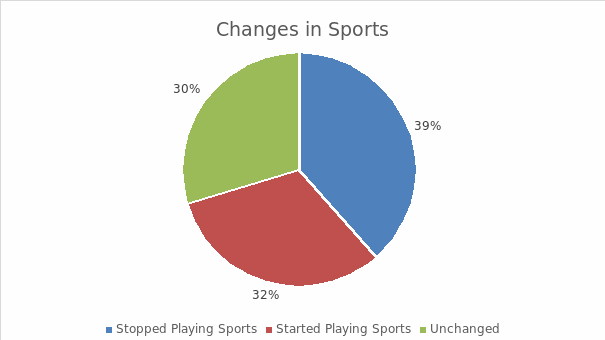
Meals
Lastly, the differences in meal taking habits should be discussed. In line with the majority of other metrics, interviewees primarily did not change their meal intake, with 193 eating the same as they were before. Furthermore, similar to sports and sleep, both positive and negative trends can be observed. At least 63 subjects have skipped one of more meals, with an additional 24 skipping snacking between main meals. Another big portion of the interviewed, namely 48 people, have added 1 or more snack in between their food intake. The results signify that while a big part of the people staying in primary care do not change their eating habits, another large group of individuals experiences changes that can affect them negatively.
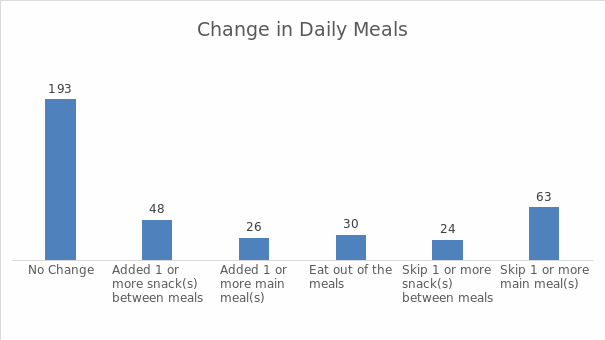
Conclusion
In closing, it can be said that the influence of primary medical care in Dubai during the COVID-19 pandemic on the daily habits of people is highly varied and warrants further research. As shown by the collected survey data, the majority of the interviewees did not significantly alter their day-to-day habits after stay, meaning that the impact of the procedure only affects a smaller portion of the population. In terms of harmful addictive habits, in this case smoking, the least amount of changes were seen, with at least 98% of all respondents remaining unchanged. Sleeping hours and meal intake, similarly, were not subject to major change. In terms of sports, participation, however, much fluctuation can be seen. Most people have either stopped or started playing sports after the end of their primary care stay. These results can indicate that the process of staying in a medical care setting can a person’s ability and/or willingness to partake in physical activity, both in negative and positive ways. Further research is needed to understand the exact causation between sports data.
References
WHO. WHO Director-General’s Opening Remarks at the Media Briefing on COVID-19—2020.
Sandford, A. Coronavirus: Half of Humanity on Lockdown in 90 Countries.
Cetron, M.; Maloney, S.; Koppaka, R.; Simone, P. Isolation and Quarantine: Containment Strategies for SARS 2003; National Academies Press: Washington, DC, USA, 2004. [Google Scholar].
Molendijk I, van der Marel S, Maljaars PW. Towards a Food Pharmacy: Immunologic Modulation through Diet. Nutrients. 2019;11(6):1239.
Caballero S, Pamer EG. Microbiota-mediated inflammation and antimicrobial defense in the intestine. Annual review of immunology. 2015;33:227-56.
Chandra RK. Nutrition and the immune system: an introduction. The American journal of clinical nutrition. 1997;66(2):460S-3S.
Dubai’s Lifestyle Clinics to adopt a new style for prevention of diseases.
Constitution of the World Health Organization. In: World Health Organization: Basic documents. 45th ed. Geneva: World Health Organization; 2005.
Who WHO. Global recommendations on physical activity for health, vol. 60. Geneva: World Heal Organ; 2010. Web.
C3 collaborating for health (2011). The benefits of physical activity for health and wellbeing. Web.
World Health Organization (2020). WHO Director-General’s opening remarks at the media briefing on COVID-19 – 2020. Web.
